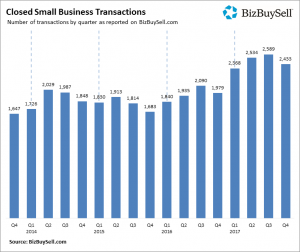We all want to start the next Apple, right? Anyone with entrepreneurial dreams envisions the startup in the garage that grows to epic success – but where these daydreams fail is where they break with reality.
Startups are really, really tough. You are fighting against highly stacked odds, jumping into a market with an unproven concept that will take far more money to get to the black than you think. You won’t have a customer base, you will be starting from ground zero with an unproven marketing plan, you will have to vet and train a brand new staff and you will be doing all of this without any cash flow.
You can, however, approach business ownership in a slightly different way, while still meeting your goals for entrepreneurship. How? Buy an existing business.
Why? Existing businesses can take some of the disadvantages of a startup off the table. Here’s how:
Existing businesses come with a customer base.
When you buy a functioning business you get the clientele as well. Contracts with customers, the regulars at the bar – they typically come with the deal. The best way to keep those customers is to avoid making any changes until you understand why those customers are there. Rate hikes on contracts and getting rid of karaoke night might seem like good ideas on paper – but they will push out the all-important customer base you inherited.
Existing businesses typically come with a marketing plan and name recognition.
One of the major challenges of starting a new business is getting the word out about who you are and what you do. An already existing business has jumped that hurdle – your job now is to push for more growth by constantly developing and improving your marketing plan.
Existing businesses have a staff in place.
A brand new business can be extraordinarily tough because there isn’t a veteran staff to show everyone the ropes. With an existing business a fully-trained staff is already in place. A caveat here – just like the advice for your customer base, major staffing changes right out of the gate will likely hurt more than they help. Take some time to understand what everyone does and how their presence helps the business before cleaning house.
Existing businesses have cash flow.
It can take months before a startup gets to a point where the cash flow is enough to cover expenses. An existing business exists because this need for cash flow has already been met. Be careful, however, not to overextend your expenses with too many changes or improvements before you fully understand where that cash flow is coming from.
The message here is while your garage-business daydream might be fun, an existing business can get you there without having to contend with the pitfalls of startup-hood.
Have you always wanted to own your own business but didn’t know you could buy one? Do you have questions about the differences in risk between startups and existing businesses? Ask us! Leave any questions or comments and we would be happy to help.
Michael Monnot
941.518.7138
Mike@InfinityBusinessBrokers.com
12995 South Cleveland Avenue, Suite 249
Fort Myers, FL 33907
www.InfinityBusinessBrokers.com








